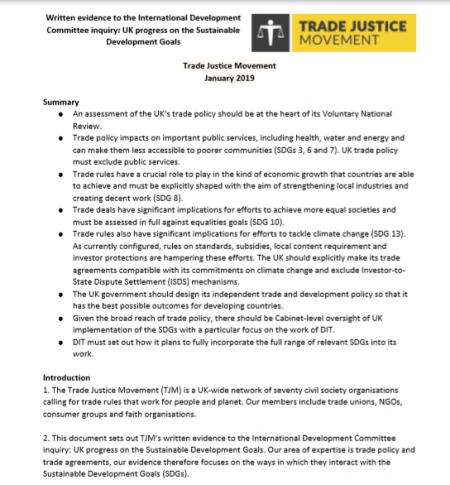Briefings TJM submission to parliamentary inquiry on progress on the Sustainable Development Goals
TJM submission to parliamentary inquiry on progress on the Sustainable Development Goals
In July 2019 the UK Government will present its Voluntary National Review to the UN, detailing the progress it has made towards the Sustainable Development Goals (SDGs) since their adoption in September 2015. The House of Commons International Development Committee is exploring how far the government has advanced the agenda.
In our submission, TJM argue that the Department of International Trade has failed to properly incorporate the SDGs into its work. This means that there is a significant risk that UK trade and investment policy and agreements could undermine efforts to achieve the SDGs. We believe that Cabinet-level oversight of UK implementation of the SDGs could help to remedy this and that ensuring the work of DIT is aligned with the SDGs should be given high priority, including as part of the UK’s VNR.
We make the following recommendations:
● An assessment of the UK’s trade policy should be at the heart of its Voluntary National Review.
● Because trade policy impacts on important public services, including health, water and energy and can make them less accessible to poorer communities (SDGs 3, 6 and 7), the UK must commit to excluding public services from future trade deals.
● Trade rules have a crucial role to play in the kind of economic growth that countries are able to achieve and must be explicitly shaped with the aim of strengthening local industries and creating decent work (SDG 8).
● Trade deals have significant implications for efforts to achieve more equal societies and must be assessed in full against equalities goals (SDG 10).
● Trade rules also have significant implications for efforts to tackle climate change (SDG 13). As currently configured, rules on standards, subsidies, local content requirement and investor protections are hampering these efforts. The UK should explicitly make its trade agreements compatible with its commitments on climate change and exclude Investor-to-State Dispute Settlement (ISDS) mechanisms.
● The UK government should design its independent trade and development policy so that it has the best possible outcomes for developing countries.
● Given the broad reach of trade policy, there should be Cabinet-level oversight of UK implementation of the SDGs with a particular focus on the work of DIT.
● DIT must set out how it plans to fully incorporate the full range of relevant SDGs into its work.
Downloads
SDGs trade and development sustainability International Development Committee
